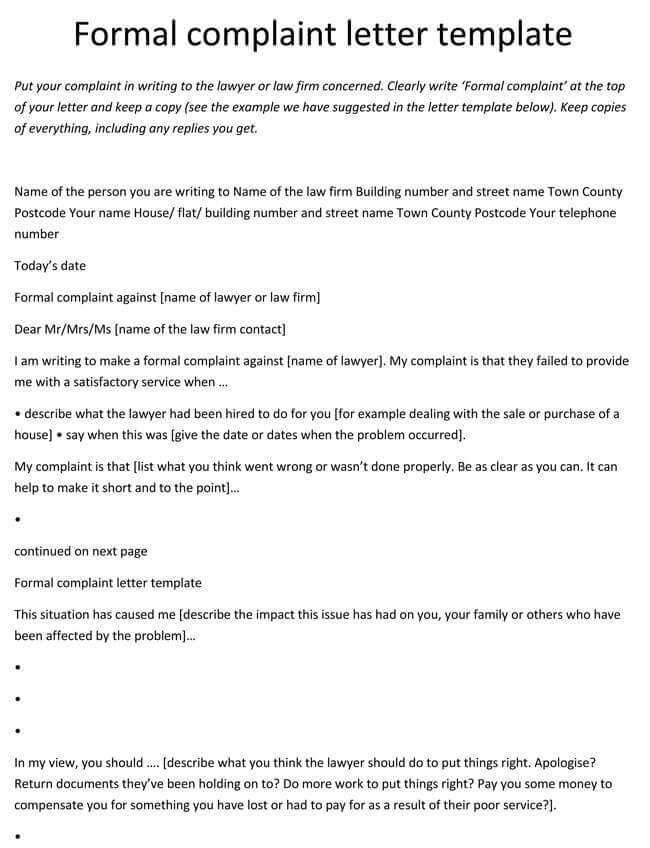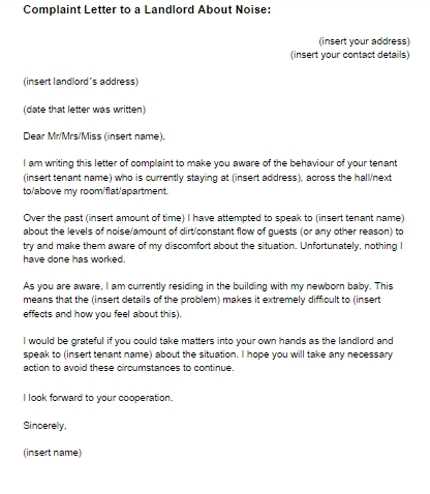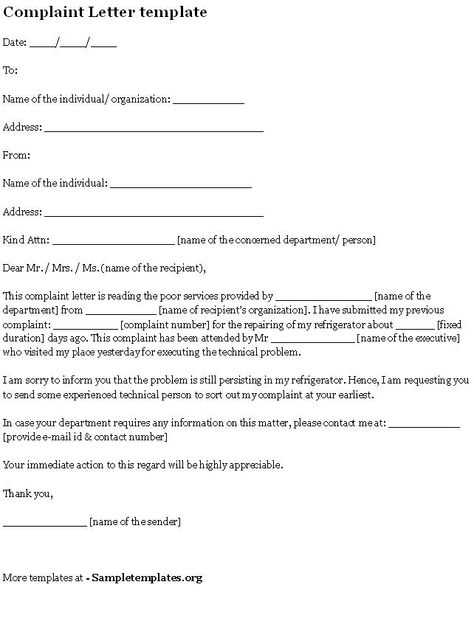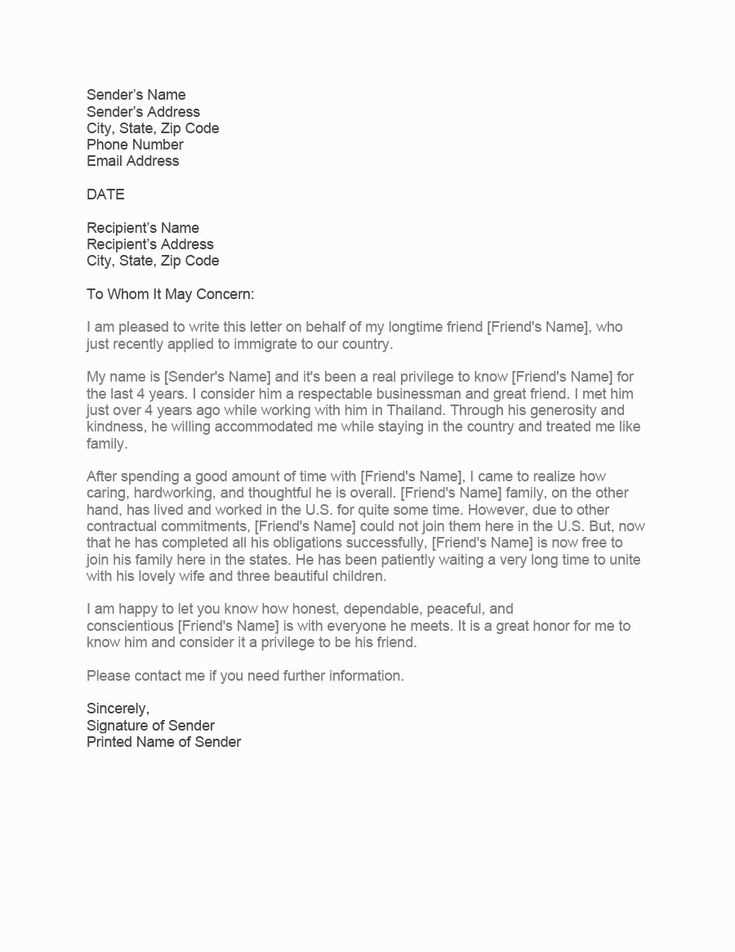Formal Complaint Letter to Landlord Template

When renting a home or apartment, disputes or unresolved issues can arise that require clear communication. Addressing these matters professionally ensures that both tenants and property owners can maintain a positive relationship and find amicable solutions. In such situations, writing a well-crafted document can effectively express concerns and encourage action.
It’s important to understand how to communicate your concerns in writing, especially when the issue involves something serious. The key is to maintain a respectful tone while clearly outlining the problem and suggesting possible solutions. This approach not only helps in getting the issue resolved promptly but also protects your rights as a tenant.
In this guide, you will find advice on structuring such a document, the elements that should be included, and common mistakes to avoid. With the right format and language, your communication will stand a better chance of receiving a timely and effective response.
How to Write a Complaint Letter
Writing a clear and effective message when addressing issues with your rental property can help ensure that your concerns are taken seriously. The goal is to convey the problem in a manner that is both professional and constructive. It’s essential to communicate in a way that invites a solution, rather than creating further tension.
Start with a Clear Introduction
Begin by introducing yourself and stating the nature of the issue. Be concise and provide key details such as dates and locations. Make it clear why you are writing and what you expect from the communication. This sets the tone for a focused and purposeful interaction.
State the Problem and Desired Outcome
In the next part of the document, explain the situation in detail, outlining what has occurred and how it has impacted you. Clearly state what action you wish to be taken, whether it’s a repair, compensation, or another form of resolution. Offering a reasonable timeline for response can further clarify expectations.
Key Elements of a Formal Complaint
To effectively address issues in a rental property, it’s crucial to include specific details that help convey the seriousness and clarity of your message. A well-structured communication ensures that the recipient understands the nature of the problem and the action required. Incorporating these key components increases the chances of a prompt resolution.
Clear and Precise Introduction

Start by providing your personal information and the specifics of the issue at hand. This should include the exact dates, the location of the property, and the nature of the concern. The introduction sets the stage, so being clear and straightforward is vital to avoid confusion.
Detailed Description of the Issue

After introducing the matter, explain it in detail. Be sure to include any relevant facts, such as what actions have already been taken or attempts made to resolve the issue. Focus on presenting the facts objectively, without emotional language, to make the problem easy to understand and address.
Desired Outcome: It’s essential to clearly state what outcome you’re seeking. Whether it’s a repair, refund, or other resolution, outline your expectations with a reasonable timeline for completion. This makes it easier for the recipient to take appropriate action.
Polite Tone: Throughout the communication, maintaining a polite tone is important to keep the conversation respectful. Even if the situation is frustrating, focusing on professionalism will ensure a more favorable response.
Understanding Your Tenant Rights
As a renter, it’s essential to know your rights to ensure that your living conditions meet legal standards and that you are treated fairly. Understanding these rights empowers you to take appropriate action when issues arise, and ensures you can advocate for yourself when needed. This knowledge not only helps you resolve disputes but also safeguards your interests as a tenant.
Legal Protections for Tenants
Tenants are protected by various laws designed to ensure safe, fair, and respectful living conditions. These protections cover a wide range of situations, from repairs and maintenance to eviction processes. Below are some of the basic legal protections tenants are entitled to:
- Right to a habitable living space
- Protection from discrimination
- Right to privacy and notice before entry
- Access to essential services (e.g., water, electricity, heating)
- Right to fair notice for lease termination
Steps to Take If Your Rights Are Violated
If you believe your rights as a renter are being violated, it’s important to take the proper steps to address the issue. Here are some actions you can consider:
- Document the issue and gather evidence (photos, written communications, etc.)
- Communicate your concerns in writing to the property owner
- Consult local tenant advocacy groups or legal services
- File a formal complaint with local authorities if needed
By understanding your rights and taking the appropriate steps, you can ensure that your rental experience is fair and that any issues are resolved properly and promptly.
When to Send a Formal Complaint
Knowing the right time to address an issue with your property is essential to resolving it effectively. Waiting too long can cause the problem to worsen, while addressing it prematurely without sufficient information may lead to misunderstandings. Timing is key to ensuring that your message is taken seriously and acted upon promptly.
If a situation isn’t resolved through casual communication or direct discussion with the property owner or manager, it may be time to formalize your concerns. This is especially true for issues that significantly affect your quality of life or safety, and when previous attempts to address them have been ignored or dismissed.
Here are some scenarios when you might consider sending a written communication:
- If there is a lack of response after multiple verbal or informal requests
- If the problem is severe and affects your well-being or property condition
- If the issue persists despite repeated attempts to resolve it
- If you need to document the problem for legal or personal reasons
By identifying the right moments to express your concerns in writing, you can ensure that your message is clear, formal, and effective in prompting a resolution.
Common Mistakes to Avoid in Letters
When addressing issues with your rental property, it’s crucial to avoid certain missteps that could hinder the effectiveness of your communication. Making errors in your writing can lead to confusion, delay, or even make your message less likely to be taken seriously. By steering clear of common pitfalls, you can ensure your message is clear, respectful, and prompts the appropriate response.
Using an Aggressive or Emotional Tone
One of the most common mistakes is allowing emotions to dictate the tone of the communication. While it’s natural to feel frustrated, especially when dealing with unresolved problems, it’s important to remain calm and professional. Using aggressive or hostile language can escalate the situation and make it harder to reach a resolution.
Being Vague or Overly Detailed

Another mistake is either being too vague or including unnecessary details that detract from the main issue. A concise and focused approach is more likely to get your message across. Avoiding excessive information ensures that the main point is clear, while leaving room for further discussion or clarification if needed.
Key Points to Remember:
- Be respectful and professional in your tone
- Stick to the facts without getting overly emotional
- Avoid excessive details or being too brief
By taking care to avoid these common mistakes, you increase the likelihood of resolving the issue efficiently and maintaining a positive relationship with your property owner.
Tips for Effective Communication with Landlord
Clear and respectful communication is essential when addressing concerns with your property manager or owner. Whether you’re raising an issue or simply seeking clarification, the way you communicate can significantly impact the outcome. Effective communication helps ensure that your message is heard and that actions are taken promptly to resolve the matter at hand.
Here are some tips to enhance your communication:
| Tip | Explanation |
|---|---|
| Be Clear and Direct | State the issue clearly, providing relevant details without unnecessary information. |
| Stay Professional | Use a respectful tone and remain calm, even if you are frustrated. |
| Document Everything | Keep records of all communication and any issues, including photos if applicable. |
| Offer Solutions | Provide possible solutions or suggestions to demonstrate your willingness to resolve the issue. |
| Follow Up | If the issue is not addressed promptly, follow up to remind them politely. |
By keeping these tips in mind, you can build a productive and positive relationship with your property manager or owner, increasing the likelihood of a quick and satisfactory resolution to any issues you may face.